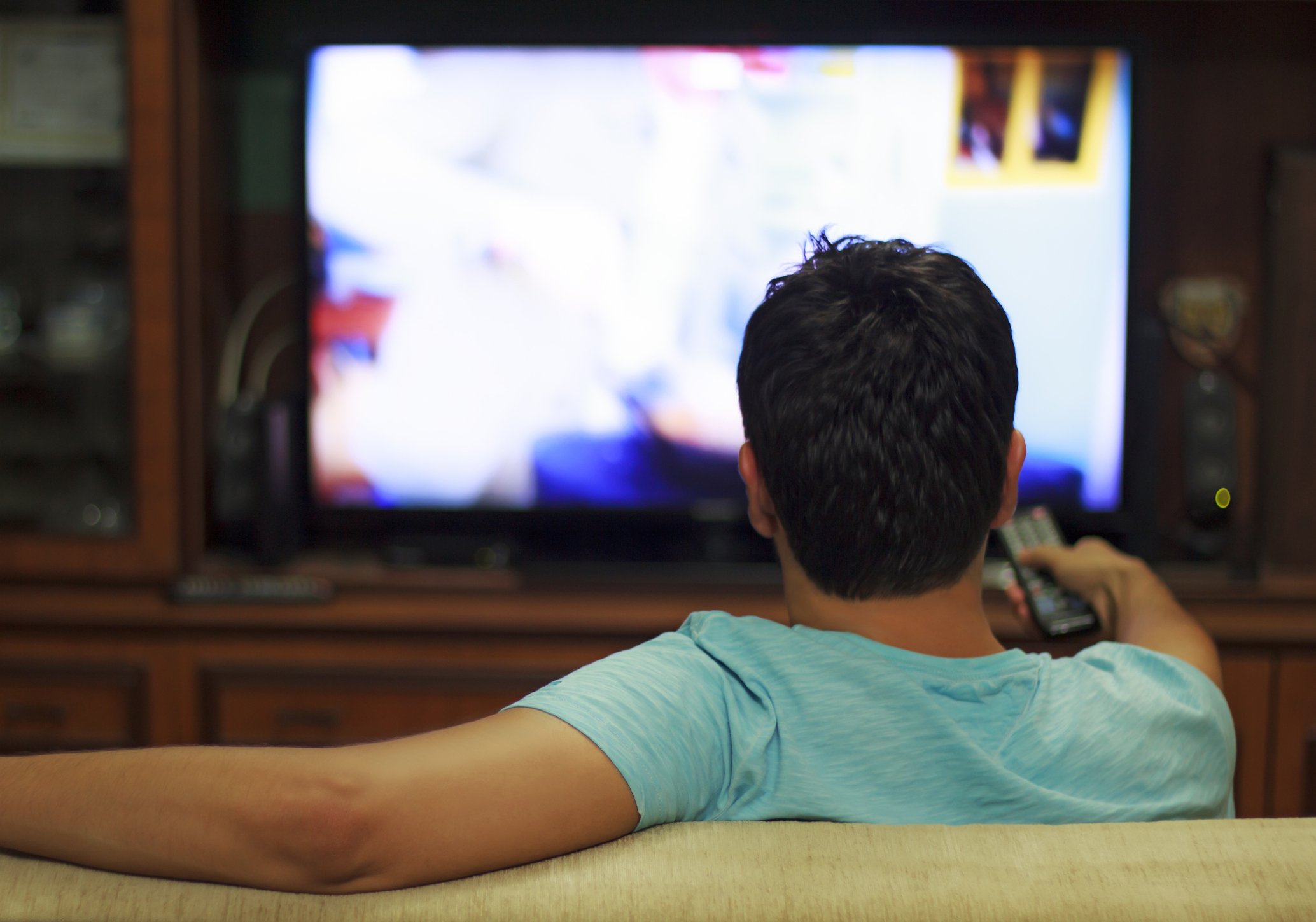
As parents, we worry about how much screen time our kids get because we care about their health and development. According to the Mayo Clinic, too much or bad-quality screen time for kids is linked to "obesity, irregular sleep schedules and shorter duration of sleep, behavioral problems, loss of social skills, violence, less time for play." Of course, we want what's best for our kids, so we monitor their screen time, but what about us? Are we monitoring our own screen time? Well, a new study from the University of Glasgow dedicated to "understanding how much TV is too much" for adults makes the case that we really should be limiting our screen time to no more than two hours a day.
More from MamásLatinas: Tips for staying focused while working from home with kids
What the study found is that health risks and mortality rates go up when you watch more than two hours of TV a day. And let's be totally honest here—watching more than two hours of TV a day, especially while we're all practicing social distancing, is not uncommon. Hello, we live in the era of binge-athons! But just because we can watch TV for hours on end doesn't mean we should, because it's not good for our health. Also, the only way to model healthy behaviors for our kids is to practice healthy behaviors ourselves. Keep reading to learn more about the study and be motivated to watch less TV.
How many people participated in the study?

The study included almost 500,000 people ages 37 to 73. We're not experts, but that seems like a rather large sample size. If the study had included only a few hundred participants, then we'd be more skeptical of the results. But with so many participants, it's hard to dismiss the findings as just a fluke.
What was the objective of the study?

The objective of the study was to investigate "nonlinear associations between television viewing time (TV time) and adverse health outcomes." Researchers studied how both genetics and environment can impact the development of diseases in individuals who were seemingly healthy at the time of recruitment.
How long were participants monitored?

Participants were recruited from 2006 to 2010, and they were followed from 2006 to 2018. The participants' data was linked to national routine and disease registries, and in order to reduce the chances of results being skewed, researchers excluded anyone with a noncommunicable disease, cancer, or cardiovascular disease. They also excluded anyone with an "adverse health event" in the two years before recruitment.
What did the data show?

The researchers found that participants who watched two hours or less of TV a day had the lowest health risks. According to the study, "Limiting TV time to 2 hours per day might have prevented, or at least delayed, 7.97%" of cardiovascular disease deaths and 5.62% of all deaths.
Honestly, the findings are not surprising.

"This study adds more weight to the evidence that more time spent watching TV is likely to be detrimental to health," says study leader Dr. Hamish Foster of the University of Glasgow's Institute of Health and Wellbeing. At this point, most of us are aware that it's not good to watch TV for extended periods of time, hence the term couch potato. What is surprising is that watching less TV can possibly prevent deaths. That's kind of a big deal.
This isn’t the first study to link health risks to extended TV viewing.

In 2015, another study by the National Cancer Institute found a correlation between TV viewing and an elevated risk of death from cancer, cardiovascular disease, diabetes, influenza/pneumonia, Parkinson's disease, and liver disease. It should be noted that those are all some of the leading causes of death in the United States.
The less TV you watch, the more time you have to do other things.

It's not that TV is evil or that watching your stories or novelas is a bad thing. It's that leading a sedentary life in general is bad for your health, and most of us watch TV while we are sitting and not doing much of anything else. If you cut down on your TV time to only two hours a day, then you can use some of the time you gained to go for a walk, exercise, or do something that is better for your body.
Oh, and TV time isn’t just about time spent in front of the TV.

Perhaps you think you don't need to worry about how watching too much TV can affect your health because you really don't spend much time watching an actual TV. Well, if you are watching videos on your phone or computer, you may as well be watching TV. Don't fool yourself into thinking that you're off the hook because you get your entertainment via a phone, gaming console, or some other device.
What do the experts say?

"TV time is just one of a number of potentially sedentary behaviors, which also includes screen time watching videos on your phone, which may all contribute to adverse health outcomes," says Dr. Foster.
TV time is just part of the larger picture.

"Also, there are many other contributory factors, such as unhealthy snacking and lower socioeconomic status, that are also strongly associated with both TV time and poor health outcomes," says Dr. Foster. "Further research is needed to understand all these factors and inform future advice and guidelines."
What’s the bottom line?

The bottom line is something we already knew: The more you sit around doing nothing, the more your health pays for it. "Our study suggests limiting TV time could delay or prevent a lot of adverse health," says Dr. Foster. We can all wait around for future research to tell us more of what we intuitively know, or we can start adopting healthier behaviors now.
Put down the remote and do something else.

Here are some options of things you can do other than watch TV:
- Go for a walk.
- Play board games with the whole family.
- Prep healthy meals for the following day.
- Pull out instruments, play music, and sing.
- Put on a killer playlist and dance.
- Do an art project.
- Go to sleep at a decent hour so you wake up refreshed.
Who benefits the most from replacing TV time with exercise?

This one is kind of a no-brainer, but according to the study, people who normally spend very little time exercising are the ones who will get the most benefit from replacing time usually spent watching TV with exercise. It makes sense that if you don't normally exercise, swapping out TV time for movement is better for your health.
But what if you’re not at all excited about replacing TV time with exercise?

Remember that you can exercise at your own pace. It's about doing what works for you and your body. Start slow, listen to your body, and do things that don't make you miserable. For example: If you don't like running, then walk. If you'd rather blast some music and dance, then go for it! You can even use your TV time as a motivator to exercise. You could put yourself on a no-exercise, no-TV-time routine, so that in order to even get TV time, you have to exercise first.
Use tools to make sure you aren’t getting too much screen time.

Just like we use parental controls to help us keep our kids safe online and to limit their screen time, we can use them on ourselves. Set a timer when you are watching TV, and once your two hours are up, turn the dang thing off. It will still be there tomorrow—we promise.




